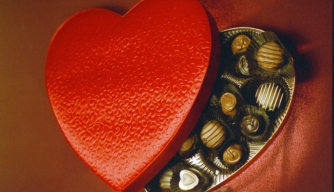It’s that time of year again—another holiday full of candy, cards, and gifts. Peering beneath the commercial veneer, we do find a wholesome value at the core of Valentine’s Day. But it’s a value that needs to be reclaimed.
I find it tragic how the beautiful, universal experience of love gets idealized in fairytales and media, especially on Valentine’s Day. These messages would have us believe that love is a pure feeling, a kind of ecstatic, joyful state in romantic encounters.
The reduction of love to a romantic feeling compounds the sense of disempowerment and spiritual impoverishment that is endemic in modern society. We have misconstrued love into an unattainable state. Romantic love is fickle, dependent on outer conditions that are often beyond our reach. Perhaps it is our hunger for love that has made the word so ubiquitous as to lose its meaning, “I love chocolate!”
Nuances of Love
The Greeks had different words for many kinds of love: eros, erotic love; philia, the love of friendship; storge, familial bonds of affection; ludus, the playful love of children; pragma, deep, hard-won love of life partners; philautia, self-love of unhealthy narcissism or healthy inner kindness; and agape, an unconditional, selfless love for all.
Reflecting on this nuanced range of feelings adds depth and richness to the meaning of the word. Love is more than a feeling. Look within and you can become aware that we each have a need for love—a longing to give and receive loving kindness with other beings.
Recognizing our need for love can be empowering, as it opens the door to creative ways of sharing, expressing, and welcoming love into our hearts. When we know that we have a need for love, we can get about the business of meeting it. When we understand that others have a need for love, we see our shared humanity.
““There are no great acts of love, only small acts done with great love””
The Force of Love
Love is also a capacity – it is a quality of the heart that we can cultivate through mental, verbal, and physical actions. As the Dalai Lama has said, “If we were aware that we all contain love within us, and that we can foster and develop it, we would certainly give it far more attention than we do.” We can regard ourselves, others, and the world with a loving attitude. We can speak words with loving intent, or engage in small acts based on loving-kindness. In this way, our choices become a key factor in our ability to meet our own and others’ needs for love. When we recognize this capacity, love becomes a skill and a strength, an orientation to life rather than a fleeting emotion.
Mindfulness practice depends on and enhances this capacity of love. It takes great kindness to look within and maintain awareness of our thoughts and feelings. Ironically, true self-awareness dissolves self-centeredness. The more deeply we feel our own life, the more we experience our inter-connectedness with others.
This kind of love is a force for change. It bestows the courage to face the suffering in the world and the energy to act for its healing. When we live from a foundation of love, we naturally move to help others in need. This love is the heart of nonviolence. It is what animates Satyagraha, the “truth force” of which Gandhi spoke, and a key aspect of what it means to mature as a human being.
Here is one of Dr. King’s well-known reflections on the power of love as a capacity.
MONTGOMERY, AL - MARCH 25: Dr. Martin Luther King, Jr. speaking before crowd of 25,000 Selma To Montgomery, Alabama civil rights marchers, in front of Montgomery, Alabama state capital building. On March 25, 1965 in Montgomery, Alabama. (Photo by Stephen F. Somerstein/Getty Images)
And I say to you, I have also decided to stick with love, for I know that love is ultimately the only answer to mankind's problems. And I'm going to talk about it everywhere I go… I'm not talking about emotional bosh when I talk about love; I'm talking about a strong, demanding love. For I have seen too much hate… and I say to myself that hate is too great a burden to bear. I have decided to love. If you are seeking the highest good, I think you can find it through love…
— Dr. Martin Luther King, Jr. 1967 “Where Do We Go From Here?”
So on this Valentine’s Day, I invite you to contemplate the meaning of love. How do you experience love in your life? What can you do to deepen your capacity for love? And how can your share lovingkindness with those around you?




